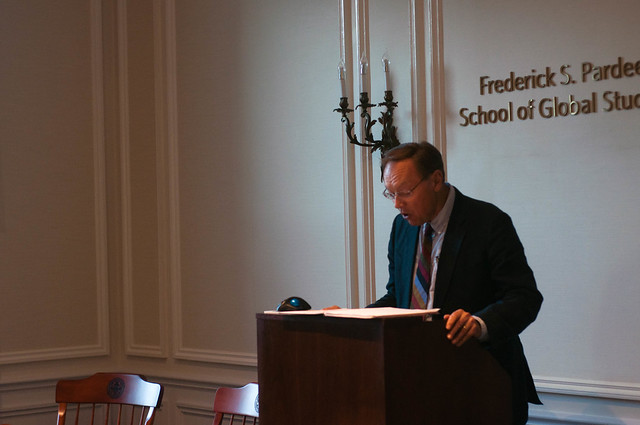Event Highlights: Polish Film Screenings at Center for the Study of Europe
On Tuesday, September 9, in collaboration with the Polish Cultural Foundation, we hosted a screening of Wladyslaw Pasikowski’s Jack Strong, a dramatization of the life of Col. Ryszard Kuklinski, a liaison officer between the Polish military command and the Soviet army, famous for passing secrets to the Americans during the Cold War. The film recast the controversial spy—regarded by many of his fellow citizens as a traitor—as a hero who acted on conscience following the Polish army’s suppression of a worker protest in 1970 and who refused any money in exchange for the Warsaw Pact secrets he shared with the CIA over nearly a decade.
The screening was introduced by Igor Lukes, Professor of International Relations and History at Boston University and Honorary Consul General of the Czech Republic in New England, and followed by a conversation with Joseph Wippl, Professor of the Practice of International Relations and former CIA officer. Prof. Wippl, after sharing his own thoughts on the film, and pointing out the obviously dramatized elements, stated that from the American perspective, Kuklinski was undoubtedly a hero. The discussion with the largely Polish audience touched on the difficulties of exfiltration, the wisdom of Kuklinski’s choices given the difficulties of his life in exile and the tragic deaths of his two sons, and the shift of emphasis within the CIA from intelligence to covert actions.
On Tuesday, September 16, in commemoration of the 70th anniversary of the Warsaw Uprising, we showed Andrzej Wajda’s 1957 film Kanal. Dark, depressing, and difficult to watch, the film is nevertheless a brilliant, and “true,” depiction of the bitter fate endured by the soldiers and citizens of Warsaw in 1944. Wajda’s symbolic story of exhausted and frightened soldiers seeking an escape route through the underground sewers during the last days of the uprising was understandably criticized by Polish audiences who wanted the deaths of their loved ones in the uprising to mean something. But, as Wajda himself says in his reflections on the film on his website, the film’s meaning is hidden deeply beneath the drama of the uprising. The truth, he intimates, lies in a poem, a fragment of which he quotes, written by a soldier named Jozef Szczepanski during the uprising:
We are waiting…
We are waiting for you, red plague,
To deliver us from black death,
To be our land once torn and quartered
Salvation met with horror …
You cannot harm us! The choice is yours,
You can help us, you can deliver us
Or still delay and leave us to die…
Death is not terrible; we know how to die.
But know this: from our tombstones
A victorious new Poland will be born
And you will not walk this land
You red ruler of bestial forces!
An animated discussion led by Poland’s Honorary Consul General Marek Lesniewski-Laas, both of whose parents participated in the uprising, followed the screening. Laas discussed the difficulty Wajda faced in making a film about the uprising during the communist period, and the need he felt to hide the film’s true meaning beneath a story that appears to dispel hope.
Our commemoration of the Warsaw Uprising continued on Tuesday, September 23, with a screening of Eugene Starky’s new documentary, Honor of the City. While the audience at our event consisted mostly of Polish expatriates, the film, which intersperses archival material with interviews of survivors and commentaries by historians and politicians, including Zbigniew Brzezinski and Normal Davies, was written with a western audience in mind. Its aim is explain the uprising, an armed revolt of Polish youth against Nazi occupiers in August of 1944 while the Red Army waited on the banks of Vistula River, which some speculate marked the beginning of the Cold War, and its enduring legacy in the Polish imagination. Once again, a lively discussion with Poland’s Honorary Consul General followed, with most of the Poles in the room agreeing that the battle, which killed a fifth of Warsaw’s citizens, had been worth it.

